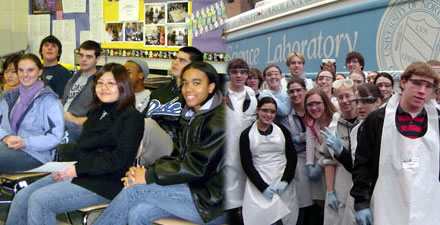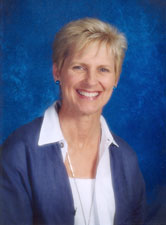Drugs, Detectives and DNA
| Author: | Patricia Ligon |
| Level: | High School |
| Content Area: | Chemistry, Biotechnology, Forensics |

| Author: | Patricia Ligon |
| Level: | High School |
| Content Area: | Chemistry, Biotechnology, Forensics |

 Pat Ligon:
Pat Ligon:I am a chemistry teacher at Broughton High School in Raleigh, North Carolina developing this curriculum through a Kenan Fellowship from North Carolina State University in partnership with the North Carolina Department of Public Instruction. My mentors in this partnership are Dr. Stephan Franzen and Dr. Maria Oliver-Hoyo, professors in the Chemistry Department at North Carolina State University.
Quarter 1: Pharmacology I received my Master's degree in Physiology and Pharmacology from Florida State University in 1970. I worked in Dr. Michael Greenberg's Physiology and Pharmacology research laboratory studying cardioactive agents in molluscan tissues for four years. In 2000, I became involved in the Pharmacology Education Partnership (PEP) at Duke University with Dr. Rochelle Schwartz-Bloom and Dr. Myra Halpin from North Carolina School of Science and Math. The Chemistry Applications curriculum includes parts of the PEP curriculum and the NIH module "The Brain: Understanding Neurobiology through the Study of Addiction". These experiences with Physiology and Pharmacology provide the background for part of this curriculum.
Quarter 2: Biotechnology In 1973, I completed the coursework for a Ph.D in Biochemistry and Biophysics at Texas A & M University in College Station, Texas. At Texas A & M University, I worked and studied with Dr. Gerard O'Donovan on Aspartate Transcarbamylase, an enzyme involved in pyrimidine biosynthesis. In addition, I worked in the Genetics department at North Carolina State University with Dr. Stephanie Curtis for seven years studying regulation of nitrogen fixation genes in Cyanobacteria. Additionally, I have completed biochemistry and biotechnology courses at North Carolina State University and on the "Destiny Bus". The Destiny Bus which is based at the University of North Carolina at Chapel Hill has as its origins, "The City Lab" outreach program from Boston University School of Medicine (http://www.bumc.bu.edu). The Destiny Bus (http://www.unc.edu/destiny/whoweare.htm) travels as an outreach program to bring many student and teacher friendly biotechnology activities to the middle schools and high schools in North Carolina. These experiences in Biochemistry and Biotechnology contribute to this curriculum.
Quarter 3 and 4: Forensics The second semester Forensics course uses the background information and lab activities developed in the first semester (Pharmacology and Biotechnology) to actively involve students in real life scenarios often focusing on chemistry aspects of forensic science. Previously, I have completed units on forensics within my basic physical science and chemistry classes. The students involved in these activities have thoroughly enjoyed solving these crimes using scientific methodology. A large part of crime laboratory work involves drug analysis and DNA technology to identify victims and criminals. The current interest in forensics within the classroom and with the general public motivates and enables students to connect high school science experiences to the real world.
Contributors: I would like to offer a special thanks to the following contributors: